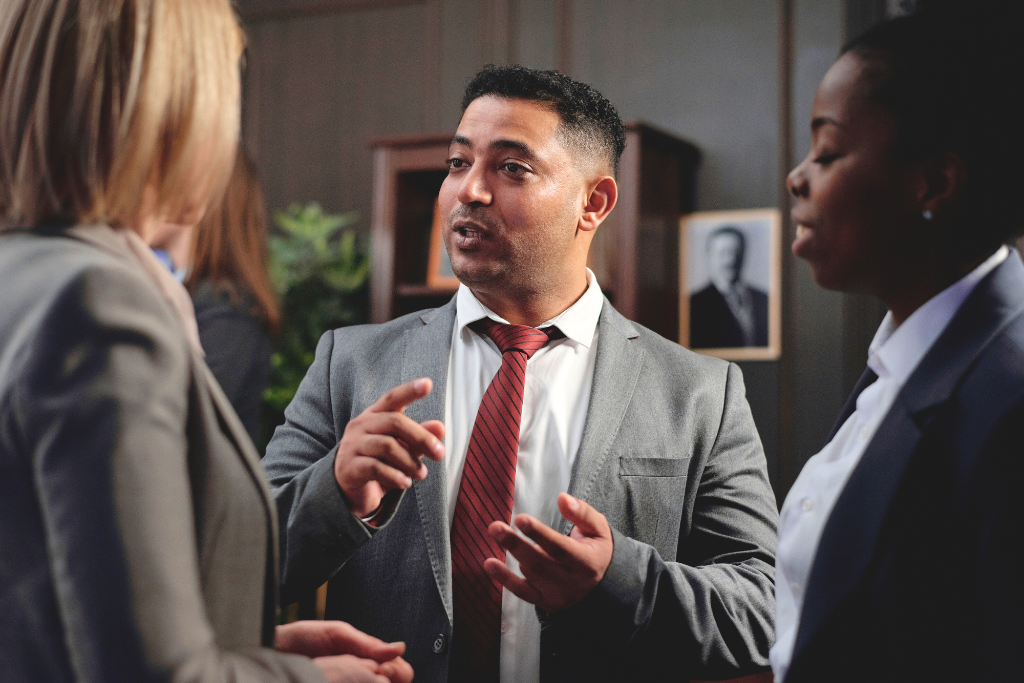
Do You Need A Solicitor To Sell Your House?
Looking at whether you need a solicitor to sell your house, and the difference between solicitors and conveyancers.

Table of Contents
Do You Need A Solicitor To Sell Your House?
Hiring a solicitor to sell your home is not legally required, but it is highly recommended.
Selling a house can be complex, and many legal and financial considerations must be considered. A solicitor can help you navigate the process and ensure everything is done legally and correctly.
When you sell your property, a solicitor will offer you a conveyancing service where they will check the legal title of the property, ensuring you have the legal right to sell the property and make sure there are no restrictions or issues with the title.
The solicitor will guide you through the process from the moment you have accepted an offer to the exchange of contracts to completion.
You will need a solicitor or licensed conveyancer, whether you are selling a property via auction, an estate agent, cash buyer or privately.
What Does A Solicitor Do?
A solicitor, property lawyer or licensed conveyancer is a legal professional who provides legal advice and representation to clients.
Their day-to-day role is advising clients on legal matters, representing clients in legal proceedings, drafting legal documents to ensure they are legally sound, conducting legal research, and managing cases.
A solicitor’s primary goal is to help their clients navigate the legal system and achieve the best possible outcome in their case. Most solicitors will have a speciality in a particular area of law, for example, property or medicine.
What Does A Conveyancer Do?
A property or conveyancing solicitor will provide legal advice and assistance to clients involved in property transactions. Their role is to ensure that the sale or purchase of a property is legal and to protect their client’s interests.
A conveyancing solicitor will advise clients on the legal aspects of buying or selling a property, including contracts, searches and surveys. They will draft legal documents, such as sale contracts, leases and transfer deeds.
A property solicitor conducts various searches, such as local authority and land registry searches, to ensure that the property is legal and that no issues could affect the transaction.
If needed, a property solicitor will negotiate with the other party’s solicitor on behalf of their client to ensure that the terms of the sale or purchase are fair and reasonable.
To ensure the process runs smoothly, the property solicitor will liaise with mortgage lenders to provide the necessary funds for completion. They will also manage the transaction from start to finish and resolve any legal issues if they do appear.
Should You Hire A Solicitor Or A Licensed Conveyancer To Sell Your House?
All solicitors can legally perform the conveyancing process, but again we recommend that you find a property specialist as they will provide a more streamlined service.
When it comes to selling a house, you can hire a solicitor or a licensed conveyancer, who are qualified and regulated professionals who can help you sell your property.
However, there are some differences between the two that you should consider before making a decision.
Solicitors are qualified lawyers who have completed a law degree and professional training; they will have a broader legal knowledge and can provide legal advice on a wide range of matters beyond conveyancing – they can even represent you in court if necessary.
Solicitors can help you in complex house-selling situations like divorce or probate as they have a more general understanding of the law.
On the other hand, licensed conveyancers specialise in property law and are trained to handle all aspects of property transactions, including buying and selling properties, remortgaging and transfer of equity. The Council for Licensed Conveyancers regulates them.
When deciding whether to hire a solicitor or licensed conveyancer to sell your property, you should consider your individual needs and the complexity of your transaction.
A licensed conveyancer may be suitable if your transaction is straightforward and you do not require advice beyond conveyancing.
However, a solicitor may be better if you need broader legal advice or representation.
How Do You Find A Solicitor Or Conveyancer?
There are several ways to find the right solicitor or conveyancer for you. The legal professionals will handle your property transactions, including asking for recommendations, using online directories, checking reviews, checking accreditation and getting quotes — so it’s vital that you find the right one for your situation.
Ask family members, friends, or colleagues who have recently bought or sold properties for recommendations when looking for a legal advisor.
Many online directories exist for solicitors and conveyancers, such as The Law Society’s Find A Solicitor or the Council for Licensed Conveyancers’ Find a Conveyancer.
By reading online reviews and testimonials from previous clients, you can get an idea of the solicitor’s experience and how their customer service is.
It would help if you always looked for any mention of contact time, as you will need to stay in touch with your solicitor as much as possible to keep the process moving forward.
Most solicitors will be part of an agency and have a conveyancing team behind them, although you may also be able to find independent solicitors.
What Are The Average Conveyancing Fees For Selling A House?
When you sell your property, the conveyancing fees will vary depending on if your property is:
- Leasehold or freehold.
- Where the conveyancer is based.
- If you are using a licensed conveyancer or solicitor.
- The price of your property.
- The length of your property chain.
- If you are in a shared ownership property.
However, saying this, the average cost of a conveyancer in the UK is £610-£950, depending on the value of your property. You can expect to pay around £300 more if the property is leasehold.
We recommend doing your research, getting conveyancing quotes from many different solicitors, and weighing these up against their online reviews before deciding.
What Is The Conveyancing Process?
The conveyancing process is the legal work behind a house purchase or sale; it will typically involve:
The conveyancing process will begin when you instruct a solicitor or licensed conveyancer to act on your behalf. We recommend finding a solicitor with prior property knowledge and excellent reviews.
Your solicitor or conveyancer will draft a contract of sale and send it to the buyer’s solicitor or conveyancer for approval.
They will then conduct various searches and enquiries to ensure the property is legal and suitable for purchase. This will include the following:
- Searches with local authorities.
- Checking Title Deeds.
- Raising any necessary enquiries with the buyer’s solicitor.
If you require a mortgage to purchase your onward purchase, the solicitor will liaise with your mortgage provider to ensure the funds are available for completion.
Once all the necessary checks and searches have been completed and any issues resolved, you and the buyer will exchange contracts. This is a legally binding agreement to sell and purchase a property.
On the agreed completion date, the purchase price balance will be paid, and ownership of the property will transfer to the buyer.
Your solicitor will register the property in your name and pay any necessary stamp duty; they will also send you a final report and account.
What If Your House Sale Falls Through?
If a house sale falls through, the solicitor’s role will depend on the circumstances and terms of their agreement with you. In most cases, the conveyancing fees must still be paid, even if the sale does not progress.
However, some solicitors may offer a “no sale, no fee” arrangement, where they will only charge fees if the sale is completed.
It’s essential to check the terms of the agreement before you instruct the solicitor before hiring them to ensure that you understand what fees will be payable in the event of a failed sale.
If the sale falls through due to issues with the legal process, such as problems with the title or searches, the solicitor may need to continue working to resolve these issues even if the sale does not proceed — in this case, you will still need to pay the solicitor fees.
Suppose the sale falls through due to issues outside the solicitor’s control, such as the buyer pulling out or the property being withdrawn from the market. In that case, the solicitor’s role will be limited to advising on legal implications and finalising outstanding matters, such as returning deposited funds.
In any case, it’s essential to maintain good communication with the solicitor throughout the process and to seek their advice and guidance if any issues arise.
Can I DIY The Conveyancing Process?
While it is legally possible to handle the conveyancing process yourself, it is generally not recommended.
The conveyancing process involves many legal and financial considerations, which can be complex and time-consuming.
You must have a solid understanding of property law and be familiar with the conveyancing process to complete the process correctly and efficiently.
Instructing a solicitor or conveyancer to carry out the legal legwork is generally recommended. Hiring a qualified and experienced solicitor or licensed conveyancer to handle the process on your behalf is worth the investment.
There are many potential risks associated with DIY conveyancing, including:
Making Errors Or Omissions
With a proper understanding of conveyancing’s legal and financial aspects, you may avoid errors or omissions that can have serious consequences.
Delays
Handling the conveyancing process yourself can be time-consuming, and if you make any mistakes, it can cause delays that can be costly and frustrating.
Legal Issues
If legal issues arise during the process, such as buyer or property title problems, you may need more legal expertise to resolve them.
Liability
You may be liable for any resulting losses or damages if you make any mistakes or omissions during the process.
Can A Solicitor Help When Selling A Leasehold Property?
It doesn’t matter if you are selling a leasehold or freehold property; you should seek the guidance of a solicitor.
However, as leasehold properties tend to be more complex, we recommend hiring a specialist leasehold solicitor trained to deal with tenanted properties.
A leasehold solicitor or conveyancer will be able to help you review the lease and advise you with any restrictions or obligations that may affect the sale, such as requirements to obtain consent from the landlord or comply with certain conditions.
Like the standard conveyancing process, the solicitor must also conduct searches to ensure that no outstanding charges or arrears are owed to the landlord, third party or management company that could affect the sale.
The property solicitor will then advise on any service charges or ground rent payable and ensure that these are properties apportioned between the buyer and seller. They will then draft any legal documents, such as the contract of sale and transfer deeds.
Once completion day comes around, the leasehold solicitor will then handle the completion of the sale, ensuring that all necessary documentation is signed and exchanged and that the sale proceeds are property distributed.


